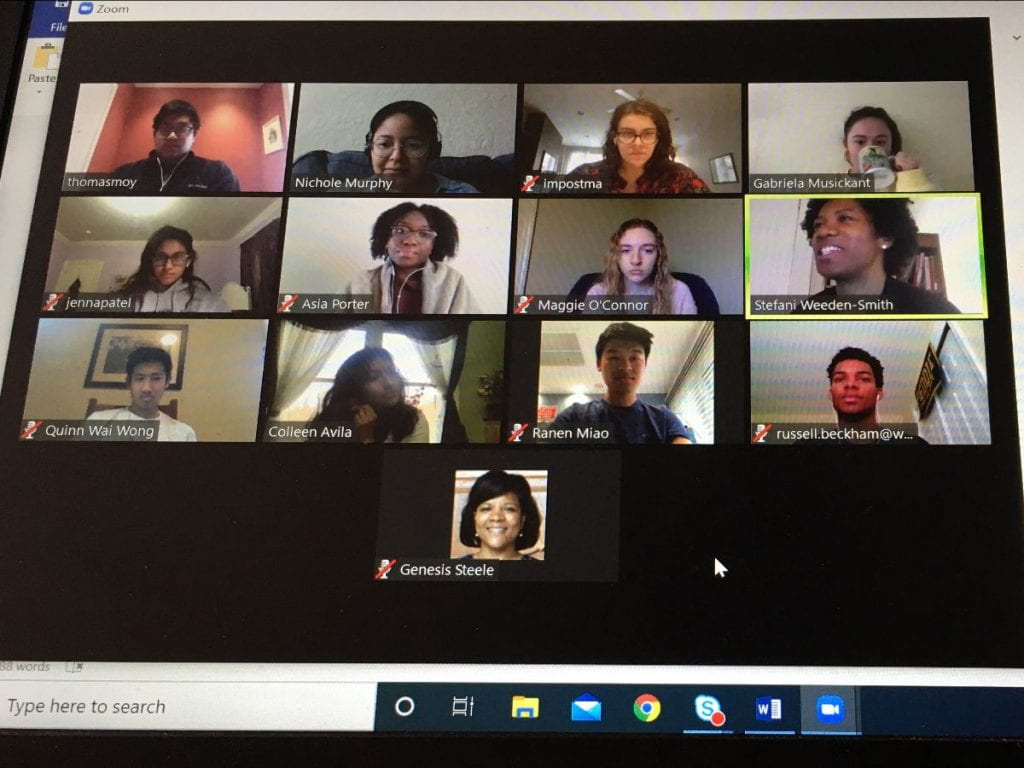
Back in March, it was hard to imagine what the summer might hold. Indeed, the decision to move forward with the Goldman Fellows Program this year was fraught with concerns about how the COVID-19 pandemic was impacting our students and St. Louis community organizations. Ultimately, moving forward with the program in a remote format proved to be beneficial for all involved.
At the core of the Goldman Fellows Program is positioning students to become engaged St. Louis citizens and supporting regional progress through local organizations. With that in mind, ten Goldman Fellows were positioned to provide support to 9 local organizations through remote internships. These internships were intentionally selected to place fellows in situations in which they could engage with the challenges of this civic moment, with specific attention on the public challenges created and exacerbated by.
Fellows working at the United Way of Greater St. Louis spent time with the 2-1-1 regional response team, while fellows working with Beyond Housing focused on increasing census completion in the 24:1 footprint. Fellows working with funding organizations – St. Louis Community Foundation and Invest STL – were able to support the work of providing resources to neighborhoods, organizations, and initiatives as needs emerged. At Operation Food Search, a fellow assisted in tracking food sites to help the organization understand where there might be gaps in service.
During this unusual summer, Goldman Fellows were able to grow as St. Louis citizens while engaging in impactful work with local organizations. The program utilized a responsive curriculum that created additional support for fellows in processing emergent issues within their internships but also relating to the Movement for Black Lives and COVID-19. Fellows made meaning out of their experiences through weekly reflections, synchronous and asynchronous discussions, bi-weekly seminars and small group meetings culminating in final presentations that examined the intersection between a salient systemic issue impacting St. Louis and their experiences working at their internship organizations. When asked to reflect on their experience, fellows said:
“My Goldman Fellows experience motivated me to become more involved in St. Louis politics and advocacy. I am currently working on a campaign that I believe will help advance social justice and promote better access to healthcare, two of the largest barriers I saw in the community during my time in the Goldman Fellows Program.” – Maggie O’Connor, ‘22
“Throughout the summer, witnessing the death of George Floyd and many others due to racial injustice set a tragic undertone to most of the summer. I struggled a lot with a quote from James Baldwin when he talked about the Civil Rights Movement, and there being a fine line between being a witness or an actor in cultures that perpetuate violence or suffering. Through my experience with the Goldman Fellows, as I had been working within primarily North County, I saw not only the current conditions but also the history of corruption and inequality that is rooted within many black and brown communities. I continually question what civic engagement means for me, but I believe that it’s rooted in finding answers of how to end cycles of inequality and facilitate meaningful progress.” – Russell Beckham, ‘21
“Initially, I believe that there were two distinct worlds that I live in: the STEM world and the community service world. Working at LaunchCode helped me realize the future potential of work with both in a new and exciting way. After the internship, I realized that these two worlds like a 3D venn diagram had some intersection to them after all.” – Quinn Wai Wong, ‘23
The impact of this year’s intersecting crises will be felt for a long time. “Having the opportunity to work with the ACLU-MO on its 2020 Public Health in Corrections Report helped me to further see the gaps in our current healthcare system. While discourse concerning public health and how to limit the spread of COVID-19 has been plentiful, the jail/prison population is a sect of society that I feel has not been sufficiently advocated for. Through this report, we highlight systemic issues and outline areas of future research, which may be used as the basis of future legal intervention, legal advocacy, and public policy advocacy. In this way, I feel that my work this summer will not only have an impact on the current crisis by ensuring the needs of incarcerated people do not continue to be overlooked but also aid in general conversations about criminal justice reform.” – Asia Porter, ‘22
“I previously recognized grassroots community development work as the key to civic engagement. I now identify this more broadly as collective action and community organizing, which I see taking many forms. Mutual aids funds, community gardens and pantries, clothing and book swaps, skills workshops, legal aid, voter education, family counseling, mental health support, are all examples of civic engagement that puts the power back in the hands of the community.” – Gaby Musickant, ‘22
Article by Nichole Murphy